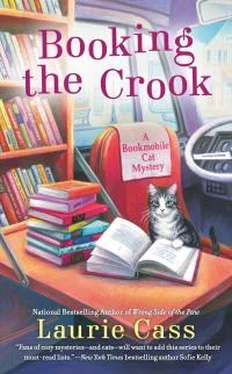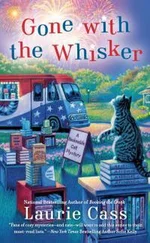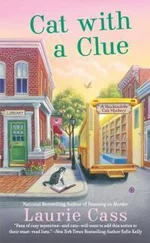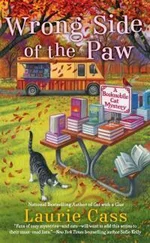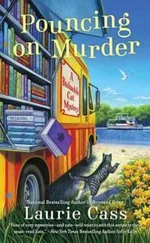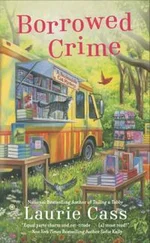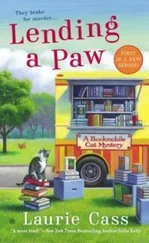“All you have to do is find a treat he does like.” Julia tapped the carrier with the toes of her boots. “How hard could that be? I mean he eats bread, for crying out loud, so you’d think any cat treat would be—”
“Mrr!”
Julia instantly stopped tapping. “Sorry, Master Edward. You usually don’t mind.”
“MRR!!”
The insides of my ears cringed. “Geez, Eddie, quit it already, will you? This is an enclosed space and—”
“MRRR!!!”
I braked to as quick a stop as I could, because that last howl had sounded so horrible that I was sure he was being drawn and quartered by the unseen foes Mr. Zonne had been battling. Julia opened the carrier door and I laid myself across the console, putting my head at cat level. “Are you all right, pal?” I asked, peering in.
Eddie was sitting smack in the middle of the carrier’s floor, staring at me with that look he was so good at giving, the one that conveyed contempt, irritation, annoyance, and a teeny bit of tolerance for the antics of his staff.
He didn’t say anything, so I reached in. A deep purr started almost immediately.
“You are a rotten cat.” I gave him a pat and latched the door.
“He’s really okay?” Julia asked, frowning.
“As okay as he’ll ever be.” I pushed myself back upright and reached over for the seat belt. In doing so, I noticed the house on the opposite side of the road.
Around us, the land was wide and rolling. The trees had been clear-cut for lumber a hundred years ago and, due to poor soil, they hadn’t fully regrown. Properties out here tended to be multiple acres, and neighbors were often barely within shouting distance. As a result of low density and disinclination for governmental interference, many of the townships on this side of the county had few regulations, a situation that could allow circumstances that would draw neighborly ire in more populated areas.
Like the house over there. Even in February, its huge front yard was occupied by a row of cars facing the street. They were, of course, snow-covered, but I’d seen them often enough in warmer times to know they were all for sale at Low, Low Prices!
“Hmm,” I said.
“What’s that?” Julia asked.
I drummed my fingers on the steering wheel, then pulled out my cell phone. “Listen in,” I told her, and dialed the phone number for Deputy Ash Wolverson.
“Hey,” he said, answering straightaway. “You guys okay?”
I looked down at my arms and legs. Looked over at Julia and Eddie. All safe and sound. “Sure. Why wouldn’t we be?”
He blew out a sigh. “Lots of accidents today. The direction of the wind yesterday drifted shut most of the back roads, and you drive that bookmobile all over, and . . . well, anyway, what’s up?”
A warm and fuzzy feeling curled up around my heart. Though Ash and I hadn’t worked out as a couple, our new friendship was turning into something solid, something I hoped would last for years. “Did Leon Clohessy call you?” I asked. “About that SUV with a missing headlight he saw leaving Rowan’s house?”
“He did.” I heard the tapping of a keyboard. “Anything else?”
It occurred to me that friends could be as annoying as cats. “Yes. I assume you’re going to be checking car part stores.”
“On my list,” he said. “But I have to be honest, it’s not high up there. Hal says—”
Since I was pretty sure I didn’t want to hear what Detective Inwood had to say, I talked over him. “I was just thinking that if it was the killer in that SUV, he might have bought a new headlight from a junkyard for cash, so there’d be no money trail.”
I heard a sigh on the other end of the line.
“Yeah,” Ash said. “He or she might have.”
I felt a pang of guilt for the extra work I was tossing into his lap. He was starting to sound as tired as Hal. “Tell you what. The bookmobile route eventually goes past most of the junkyards in the county. How about if I stop and ask about headlights? If I learn anything, I’ll pass it on.”
“Knock yourself out,” Ash said. “I have to run. See you later.”
“Okay. Stay safe—”
But he was already gone.
• • •
That evening, I mulled over the events of the day. “The complications of the day, more like,” I murmured.
“Sorry?” Aunt Frances asked.
We were in the kitchen, cleaning up after dinner. Rather, I was cleaning up because my aunt had (luckily for all involved) done the cooking, and she was sitting at the kitchen table sorting through the last few days of newspapers, getting ready to read the 911 reports out loud to me.
I hesitated, then blurted out pretty much everything, starting with Mitchell’s list. By the time I was telling her about my junkyard call to Ash, I was putting away the last of the silverware. “So maybe it’s just . . . complicated,” I summed up. “What do you think?”
Aunt Frances looked at me over the top of her reading glasses. “I think you should call Anya Bennethum. And by call, I mean an actual call, not a text. The poor girl is trying to be a mother to Collier and she’s floundering.”
“I don’t know anything about being a mother,” I protested.
“No, but you’re the one she’s reaching out to.”
It took me roughly two and a half seconds to grasp the obvious. “You’re right,” I said.
“Of course I am.” She tapped the stack of newspapers. “And as soon as you finish talking to Anya, we can get back to the evening’s entertainment.” My aunt was a big believer in the carrot and stick approach, at least when it came to managing Minnie’s behavior, primarily because it worked.
“Back in a few,” I said, and headed upstairs to my room to make the call, pausing briefly to pat Eddie, who was curled up in a corner of the couch, snoring loud enough to rattle china.
“Hey, Minnie,” Anya answered a little breathlessly. “Have they arrested someone?”
“Not yet,” I said. Then, since I was still hearing panting breaths, I asked, “Um, what are you doing?”
“Oh. Sorry. I can stop.” Her breathing returned to normal. “I don’t like elevators much and my apartment is on the building’s fourth floor. Mom always said it would be good for me either way, that I’d get used to elevators or I’d get lots of exercise.”
“Your mom was a wise woman,” I said.
“She—” Anya stopped. Breathed deep. Then, “I miss her,” she said in a small voice.
What could I say to this young woman who was dealing with a kind of grief I’d never suffered, but almost inevitably would someday? I thought about my own mother, about the hole that would be left in my life if she died. “You’ll probably always miss her,” I said. “But I think it’ll get easier.”
“That’s what everybody says.” Anya sniffed.
“Since there’s no way everybody can be wrong,” I said, “it must be true.”
She sniffed again. “I want to believe that. And I almost do, but . . . how long will it be? To get to the easier part, I mean?”
I had no answer for that, of course, so I murmured something banal and trite about being patient with herself and to make sure she got plenty of rest and to eat right.
“Okay,” she said. “I’ll try.” After a beat, she asked, “So there’s nothing new, about Mom, I mean, to tell Collier?”
“Not anything substantial.” I told her about the SUV with the broken headlight and she seemed to take it as seriously as Ash had.
“Anything else?”
“Well,” I said slowly. “There’s one thing.” I girded up my courage and dove in. “I ran into your dad two or three weeks ago and he said something about your mom and Land Aprelle getting into a big argument soon before she died. I know we talked about this at the library the other day, and—” I stopped, because Anya was doing the last thing I would have guessed she’d do.
Читать дальше
